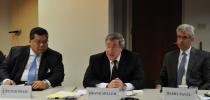
On November 21, 2011 the International Security Program and the Michael S. Ansari Africa Center hosted a meeting of the Atlantic Council Maritime Piracy Task Force, chaired by Atlantic Council Board Director Franklin D. Miller.
This is the second in a series of meetings looking into the challenge of piracy and possible strategic approaches. The first part of the discussion, led by Martin N. Murphy, resident senior fellow at the Ansari Africa Center, reviewed current actions and policies of the US government and international community to counter piracy. The second part of the discussion featured a presentation by Stephen M. Carmel, senior vice president for maritime services of Maersk Line Limited, who offered a perspective from the shipping industry and addressed the current state of relations between shippers and insurance companies as well as the current position of the labor unions. The third part of the meeting consisted of a presentation by Doug Brooks, president of the International Stability Operations Association, who focused on the potential viability of shipping companies using private armed security to protect against piracy and the legal issues that may arise from doing so. Taking part in the meeting were representatives of the US government, including military personnel, and the private sector.
As maritime piracy has emerged as a potential high profile challenge for the United States, its allies and trading partners, and global commerce, the Atlantic Council is leading a limited-duration, limited-scope project designed to produce actionable and policy-relevant analysis and recommendations on US approaches to the maritime piracy challenge in the complex international context. The Task Force will consist of a series of meetings by a standing group of high-level strategic actors-former US administration officials, distinguished members of academia, international organizations, transportation/logistics industry executives, and occasional ad hoc expert invitees to define the problem and develop courses of action for the formation of US policy. The Task Force will make explicit, implementable recommendations to key policy groups: Office of the Secretary of Defense, the Department of State, the Joint Chiefs, the National Security Council, and other elements of the interagency policy community.
